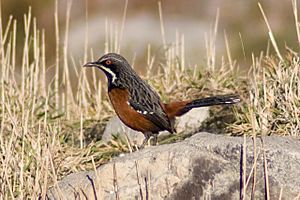Rockjumper facts for kids
Quick facts for kids Rockjumpers |
|
|---|---|
 |
|
| Cape rockjumper (Chaetops frenatus) | |
| Scientific classification |
|
| Kingdom: | Animalia |
| Phylum: | Chordata |
| Class: | Aves |
| Order: | Passeriformes |
| Family: | Chaetopidae Fjeldsa, Ericson, Johannson, & Zuccon, 2015 |
| Genus: | Chaetops Swainson, 1832 |
| Species | |
Rockjumpers are small birds found only in southern Africa. They belong to their own special group, called a genus (Chaetops), and also their own family (Chaetopidae). Think of a family as a bigger group of animals that are closely related. These birds are known for living in rocky areas, which is how they got their name!
They live in the highlands of Lesotho and parts of South Africa. Rockjumpers are omnivores, which means they eat both plants and animals. They might munch on insects, small lizards, or even some berries they find.
Contents
Meet the Rockjumper Species
There are two main types, or species, of Rockjumpers. Both look quite similar, but they live in slightly different places.
Cape Rockjumper
The Cape rockjumper (Chaetops frenatus) is one of the two species. It lives in the rocky mountains of the Western Cape and Eastern Cape provinces of South Africa.
Drakensberg Rockjumper
The Drakensberg rockjumper (Chaetops aurantius) is the other species. You can find this one in the Drakensberg Mountains, which stretch across South Africa and Lesotho.
What Do Rockjumpers Look Like?
Both the Cape and Drakensberg Rockjumpers share many features. They are mostly brown and red. Their feathers are quite colorful!
They have long tails that are a mix of white and black. Their throats are black, and their bellies are a bright orange color. If you look at their backs and wings, you'll see cool grey and black patterns. These patterns help them blend in with the rocks where they live.
Rockjumper Relatives
Even though Rockjumpers look unique, they do have relatives in the bird world. Their closest known relatives are birds called Picathartes. These birds look very different from Rockjumpers, but scientists have found they share a common ancestor.
 | Delilah Pierce |
 | Gordon Parks |
 | Augusta Savage |
 | Charles Ethan Porter |

